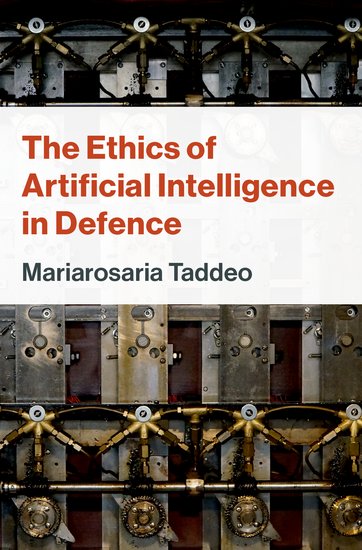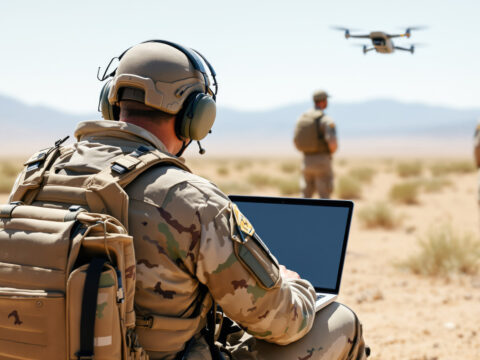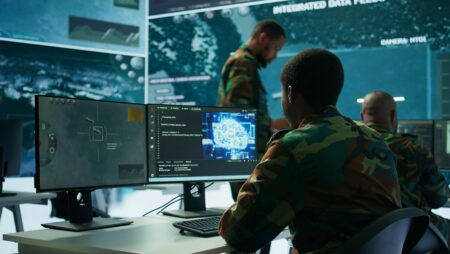By Mariarosaria Taddeo
The defence sector must address how to use advancing AI safely and effectively. Mariarosaria Taddeo offers a systematic analysis of AI’s challenges in defence, providing recommendations for policy-makers and practitioners.

Professor Taddeo is Professor of Digital Ethics and Defence Technologies. She is also the Programme Director of the DPhil in Information, Communication and the Social Sciences at the Oxford Internet Institute and Dslt Ethics Fellow at the Alan Turing Institute.
Her recent work focuses on the ethics and governance of digital technologies, and ranges from designing governance measures to leverage artificial intelligence (AI) to addressing the ethical challenges of using defence technology in defence, ethics of cybersecurity, and governance of cyber conflicts. She has published more than 150 articles in this area, focusing on topics like trustworthy digital technologies, governance of digital innovation, ethical governance of AI for national defence, ethics of cybersecurity (complete list of her publications). Her work has been published in major journals like Nature, Nature Machine Intelligence, Science, and Science Robotics.
Professor Taddeo has led, leads, and co-leads several projects in the area of Digital Ethics successfully. Most notably, she is the PI of a current project on the ‘Ethical Principles for the Use of AI for National Security and Defence’ funded by Dstl (the UK Defence Science and Technology Laboratory). She was Co-I in an EPSRC project, which funded the PETRAS IoT Research Hub. She was PI on a project funded by the NATO Cooperative Cyber Defence Centre of Excellence (CDD COE) to define ethical guidance for the regulation of cyber conflicts. Since 2017 she has been Co-PI on research projects developed at the Oxford Internet Institute such as ‘Digital Well-Being’; ‘The Ethics of Recommender Systems’; ‘Posthumous Medical Data Donation’.
Professor Taddeo is an internationally renowned scholar. She is the lead expert on the CEPS Task Force on ‘Artificial Intelligence and Cybersecurity’, CEPS is a major European think-tank informing EU policies on cybersecurity. Between 2018 and 2020 represents the UK of the NATO Human Factors and Medicine Exploratory Team (NATO HFM ET) ‘Operational Ethics: Preparation and Interventions for the Future Security Environment’.
Between 2016 and 2018, she was the Oxford Fellow at the Future Council for Cybersecurity of the World Economic Forum, helping to identify the ethical and policy cybersecurity problems that could impair the development of future societies. She has received multiple awards for her work on Digital Ethics, among which the 2010 Simon Award for Outstanding Research in Computing and Philosophy; the 2016 World Technology Award for Ethics. In 2018, InspiringFifty named her among the most inspiring 50 Italian women working in technology. In the same year, ORBIT listed her among the top 100 women working on the Ethics of AI globally, both in 2018 and 2020. She has been named one of the twelve 2020 “Outstanding Rising Talents” by the Womens’ Forum for Economy and Society. In 2020 and 2023, CoputerWeekly listed her among the top 100 most influential women in technology in the UK. She also serves as editor-in-chief of Minds & Machines (SpringerNature).
Before joining the OII, Taddeo was Research Fellow in Cyber Security and Ethics at the Department of Politics and International Studies, University of Warwick. From 2010 to 2012 she held a Marie Curie Fellowship at the University of Hertfordshire, where she was working on information warfare and its ethical implications.
She holds a PhD (Doctor Europeus) in Philosophy from the University of Padua. Her PhD thesis focused on the epistemic and ethical implications of trust in artificial systems.
Mariarosaria Taddeo’s main research areas are Digital Ethics, Philosophy of Technology, Ethics of Cyber Conflicts and Cybersecurity.
By Mariarosaria Taddeo
The defence sector must address how to use advancing AI safely and effectively. Mariarosaria Taddeo offers a systematic analysis of AI’s challenges in defence, providing recommendations for policy-makers and practitioners.


The PETRAS IoT Research Hub is a consortium of 9 UK universities working together to explore critical issues in privacy, ethics, trust, reliability, acceptability, and security.

This is an inter-divisional and multidisciplinary eight-month pilot study devoted to landscape the problem space and the future research on strategic cyber deterrence (SCD).

This project aims to analyse the new civic responsibilities of Online Service Providers, and the policies regulating them.
I serve as:
2023 – Member of the Stakeholders Advisory Body of REMIT – Reignate Multilateralism via Technology
2023 – Member of the Advisory Body of the BRAID Programme -Bridging Responsible AI Divides Programme
2023 – Member of the Board of the Italian Institute of Technology
2023 – Member of the Scientific Board of the Leonardo Foundation
2023 – Member of the Board of United Ventures, Italy
2021 – Member of the Ethics Advisory Panel on AI of the Ministry of Defence, UK
2020 – Advisor to Clearbox.AI
I conduct my research in line with the University's academic integrity code of practice.

With Professor Mariarosaria Taddeo and Sir Chris Deverell
Our experts discuss why AI adoption in defence is slow - covering procurement, regulation, and tech hurdles - and how conflicts like the Ukraine war shape its future. They also call for public debate on risks and ethics.

With Professor Mariarosaria Taddeo
Defence establishments worldwide now recognise artificial intelligence (AI) as a pivotal asset to secure a strategic advantage. Consequently, the race to harness AI for defence purposes is accelerating globally.

With Professor Mariarosaria Taddeo and Andreas Tsamados
Dr Mariarosaria Taddeo is Senior Researcher Fellow at the Oxford Internet Institute and Deputy Director of the Digital Ethics Lab. She will discuss the use of AI and it's associated trust issues in national defence.

31 March 2025
The OII's Professor Mariarosaria Taddeo explores the digitalisation of defence and its intersection with liberal democratic values.

3 February 2025
In Conversation with Professor Mariarosaria Taddeo, Oxford Internet Institute discussing the ethics of AI in defence.

22 October 2024
A new comment piece by Professor Mariarosaria Taddeo, published in leading journal Nature, proposes six principles for responsible design and development of quantum technologies for defence.

27 October 2023
The OII is leading the debate on Artificial Intelligence. Generative AI has been a key area of interest for faculty, researchers and students for many years. This article brings together some of this work to date and highlights forthcoming work.

Wired, 14 March 2025
Building common defence capabilities is a necessary step towards international stability and towards a more united Europe. But it must be done with due care

The Quantum Insider, 23 October 2024
Quantum technologies are emerging rapidly. However, a team of scientists writing in Nature warns of the absence of robust ethical frameworks for these new capabilities in health, communications, transportation and finance, to name a few.

Daily Telegraph, 10 October 2024
AI is fragile and can be attacked, say critics, who fear system ‘could be adopted without any critical thinking’.